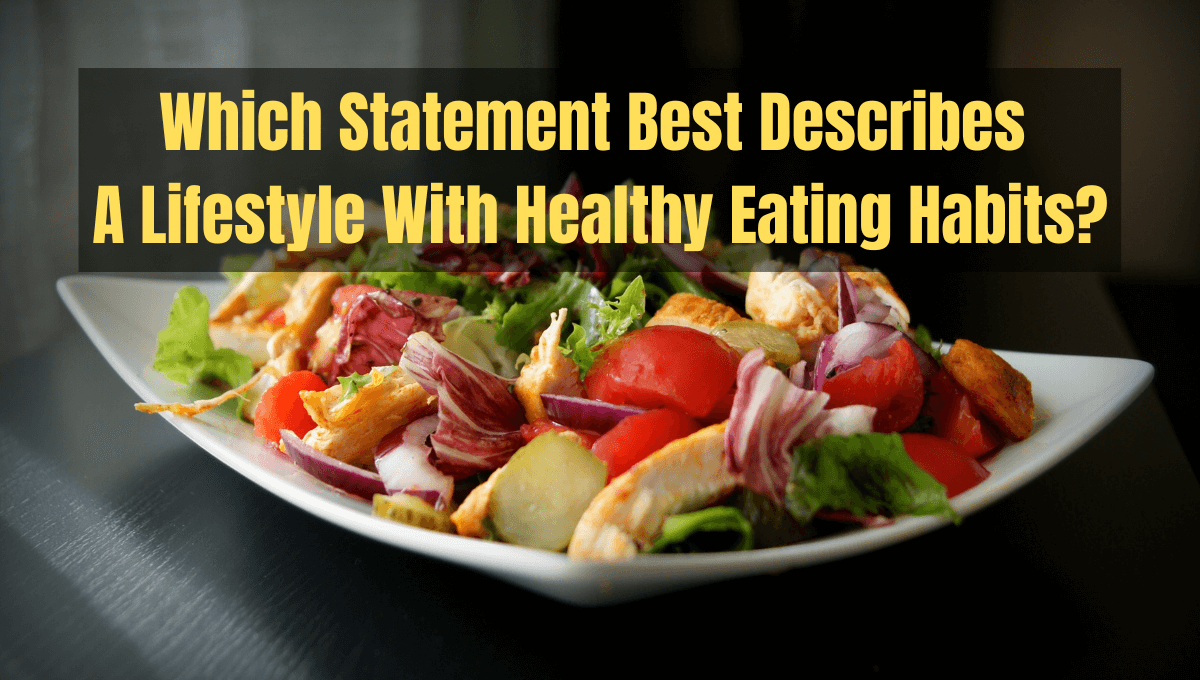“Which statement best describes a lifestyle with healthy eating habits?” is a most sought after question now-a- days for health enthusiasts. In a world where wellness takes center stage, cultivating a lifestyle marked by healthy eating habits has become increasingly pivotal. But what does such a lifestyle truly entail? To capture its essence, let’s explore “Which statement best describes a lifestyle with healthy eating habits?”

In an era where fad diets and conflicting nutrition advice dominate headlines, it can be challenging to discern what truly constitutes a healthy eating lifestyle. From low-carb to plant-based, the options seem endless, often leaving individuals confused about which path to follow. However, amidst this confusion, certain fundamental principles remain constant, forming the basis of a lifestyle with healthy eating habits. In this article, we will dissect and explore various aspects of healthy eating, aiming to clarify which statement best describes a lifestyle with healthy eating habit.
| Contents: 1. How To Know “Which Statement Best Describes A Lifestyle With Healthy Eating Habits? 1.1 Conscious Food Choices 1.2 Nutritional Value 1.3 Portion Control 1.4 Hydration 2. Benefits of a Healthy Eating Lifestyle 3. Practical Tips for Embracing a Healthy Eating Lifestyle 4. Conclusion 5. FAQs |
How To Know “Which Statement Best Describes A Lifestyle With Healthy Eating Habits?”

To know which statement best describes a healthy eating lifestyle, we have to understand the foundation of healthy eating. Which is based on:
Conscious Food Choices:
A healthy eating lifestyle is built upon a foundation of conscious food choices that prioritize nutritional value, variety, and moderation. Rather than focusing on restrictive diets, this approach emphasizes the consumption of whole foods rich in essential nutrients. Fresh fruits, vegetables, whole grains, lean proteins, and healthy fats are the essentials of this lifestyle.
Nutritional Value:
Healthy eating habits revolve around nourishing the body with the nutrients it needs to function optimally. This incorporates an equilibrium of macronutrients (carbs, proteins, and fats) and micronutrients (nutrients and minerals). Adding a colorful array of fruits and vegetables provides a spectrum of vitamins and antioxidants that support the immune system and promote vitality.
Portion Control:
Maintaining a healthy weight is a key component of a wholesome lifestyle. Portion control helps prevent overeating and allows individuals to enjoy a variety of foods without exceeding their energy needs. Being mindful of portion sizes can prevent the unnecessary consumption of excess calories, contributing to weight management and overall well-being.
Hydration:
Hydration plays a critical role in a healthy eating lifestyle. Drinking an adequate amount of water throughout the day supports digestion, metabolism, and cognitive function. Replacing sugary beverages with water or herbal teas can reduce calorie intake and help maintain optimal hydration levels.
Benefits of a Healthy Eating Lifestyle

The benefits of adopting a healthy eating lifestyle extend far beyond physical health:
Increased Energy Levels:
Nourishing the body with nutrient-dense foods provides a steady source of energy, reducing the reliance on caffeine or sugary snacks for quick energy boosts. Balanced meals stabilize blood sugar levels, leading to sustained vitality throughout the day.
Improved Mental Clarity:
A diet rich in essential nutrients supports brain health, enhancing cognitive function and mental clarity. Omega-3 fatty acids found in fish, nuts, and seeds, for instance, have been linked to improved memory and focus.
Enhanced Mood:
The gut-brain connection highlights the impact of nutrition on mood regulation. A diet high in whole foods and gut-friendly probiotics can positively influence mental well-being and help manage stress and anxiety.
Longevity and Disease Prevention:
A healthy eating lifestyle is a powerful tool in reducing the risk of chronic diseases such as heart disease, diabetes, and certain cancers. Antioxidants and anti-inflammatory compounds found in fruits, vegetables, and whole grains play a pivotal role in disease prevention.
Sustainable Weight Management:
Unlike fad diets that often yield temporary results, a healthy eating lifestyle supports sustainable weight management. By focusing on balanced meals and portion control, individuals can maintain a healthy weight over the long term.
Are you struggling to lose weight no matter how much you diet ? It’s may be not your fault. Here is a solution, check the reason behind it.
Practical Tips for Embracing a Healthy Eating Lifestyle
In today’s fast-paced world, adopting a lifestyle with healthy eating habits is essential for maintaining overall well-being and reducing the risk of chronic diseases. Here are some practical tips to help you build and sustain a healthy eating lifestyle:

- Plan Ahead: Planning is the cornerstone of a healthy eating lifestyle. Take time to plan your meals and snacks for the week ahead. This practice ensures that you have a consistent intake of nutritious foods and reduces the likelihood of making impulsive, unhealthy food choices. Consider creating a weekly meal plan, making a shopping list, and preparing healthy snacks in advance.
- Mindful Eating: Mindful eating is about savoring each bite and being fully present during meals. Eat slowly, paying attention to the taste, texture, and aroma of your food. Listen to your body’s hunger and fullness cues. This mindful approach not only enhances your appreciation of food but also helps prevent overeating and promotes a healthier relationship with eating.
- Variety is Key: A diverse range of foods provides a wide spectrum of nutrients necessary for good health. Include a colorful array of fruits and vegetables, lean proteins, whole grains, and healthy fats in your diet. Experiment with different foods and recipes to keep your meals exciting and nutritionally balanced.
- Cook at Home: Cooking at home gives you control over the ingredients and portion sizes in your meals. It allows you to choose healthier cooking methods, such as steaming, grilling, or baking, instead of frying. When you cook at home, you can reduce the use of unhealthy additives and preservatives commonly found in restaurant and processed foods.
- Limit Processed Foods: Highly processed foods are often loaded with added sugars, unhealthy fats, and excessive sodium. These ingredients can contribute to various health issues, including obesity and heart disease. Minimize your consumption of processed foods by opting for whole, unprocessed alternatives whenever possible. Fresh fruits, vegetables, lean proteins, and whole grains should take precedence in your diet.
- Read Labels: Become a savvy shopper by carefully reading nutritional labels on packaged foods. Pay attention to serving sizes, calorie content, and the amounts of sugar, saturated fat, and sodium. Look for foods with shorter ingredient lists and fewer additives. Use this information to make informed decisions about which packaged products align with your healthy eating goals.
Building a healthy eating lifestyle takes time and commitment, but the long-term benefits are well worth it. By following these practical tips, you can make gradual and sustainable changes to your diet, improving your overall health and well-being.
You May Also Like To Read:
>> 9 Easy Ways To Raise Your Core Body Temperature
>> 8 Effective Ways To Get “A Lean Belly”
>> 5-Minute Plank Workout : The Ultimate Challenge
>> What Are 5 Possible Reasons For Taking Supplements Or Drugs As Part Of A Workout Regime?
Conclusion:
The statement that best describes a lifestyle with healthy eating habits is a comprehensive amalgamation of various principles. A balanced diet that includes a variety of macronutrients and micronutrients, whole and minimally processed foods, mindful eating, portion control, and proper hydration collectively create a foundation for optimal health. It’s important to approach healthy eating as a lifelong journey, making mindful choices that align with one’s individual preferences and nutritional needs. By following these principles, individuals can cultivate a sustainable and rewarding relationship with food that promotes not only physical health but also overall well-being.
Finally, I hope that this article answers the readers the question “Which statement best describes a lifestyle with healthy eating habits?
FAQs:
Q1: What are healthy eating habits?
Ans: Healthy eating habits refer to a set of behaviors and choices that prioritize the consumption of nutritious foods to support overall health and well-being. These habits involve making mindful decisions about the types and quantities of foods you eat.
Q2: How to create healthy eating habits?
Ans: 5 Best Ways To Healthy Eating Habits:
a)Diminish admission of destructive fats in the body
b) Balance Diet
c) Keep up with appropriate food cleanliness prior to preparing any dinner
d) Eating entire natural product rather than juices
e) Try not to smoke and keep away from the destructive utilization of liquor
Q3: Is it necessary to follow a specific diet to have healthy eating habits?
Ans: No, it’s not necessary to follow a specific diet to have healthy eating habits. Healthy eating can be achieved by making balanced and sustainable choices based on your individual preferences and nutritional needs. It’s more about adopting a long-term approach to eating rather than adhering to strict diets.
Q4: Are cheat meals or occasional indulgences okay with healthy eating habits?
Ans: Occasional indulgences or cheat meals are acceptable as long as they don’t become a regular pattern. It’s important to strike a balance between enjoying treats and maintaining a generally healthy diet. Moderation is key.
Q5: How can I start adopting healthy eating habits if I’m new to this lifestyle?
Ans: You can start adopting healthy eating habits by gradually making small changes to your diet. Focus on adding more fruits and vegetables, reducing sugary and highly processed foods, and paying attention to portion sizes. Seeking guidance from a registered dietitian or nutritionist can also be beneficial. Remember that it’s a journey, and progress takes time.
Q6: How can I maintain healthy eating habits when dining out or at social events?
Ans: Look for healthier options on restaurant menus, ask for modifications to meals if needed, and practice portion control. At social events, try to make balanced choices and enjoy the company rather than overindulging.
Q7: Can a healthy eating lifestyle be suitable for vegetarians, vegans, or people with dietary restrictions?
Ans: Absolutely. Healthy eating can be adapted to various dietary preferences and restrictions. Vegetarians and vegans can meet their nutritional needs with plant-based foods, and individuals with specific dietary requirements can find alternative options that align with their health goals.
